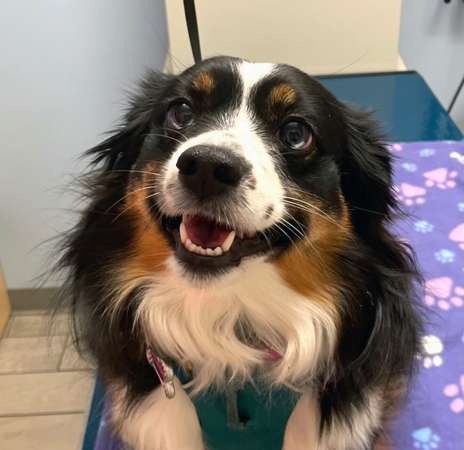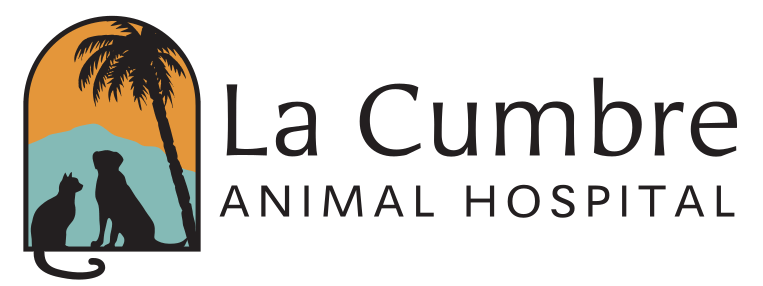What is considered preventative care for dogs?
At La Cumbre Animal Hospital, we consider preventative care a yearly wellness exam where we can evaluate a patient's overall health & wellbeing. Your pup's general wellness is considered through both your vet performing a nose-to-tail physical examination and discussing your pup's lifestyle. These exams allow your veterinarian to make yearly recommendations for care & treatment that best suit your individual dog. Our goal is to catch any potential health issues ahead of time and keep your pup in tip-top shape!
What information does my veterinarian need to know about my dog’s lifestyle before providing preventive care recommendations?
Your vet wants to know everything about your dog's day-to-day routine! This includes whether or not they are exposed to other dogs & wildlife through boarding, daycare, and the great outdoors, as this will determine recommended vaccines & parasite prevention. Your vet is also reviewing your dog's diet, exercise, and general behavior. All of this information allows your vet to determine how to keep your pup happy & healthy!

What recommendations will my veterinarian make when it comes to my dog’s preventive care plan?
- Brushing teeth: Our vets recommend brushing your dog's teeth as the gold standard of dental care. However, they are aware that some pup's won't allow for daily or weekly tooth brushing, so our office carries a variety of dental chews - including Oravet & pressed rawhide Enzymatic chews - to help keep your dog's teeth clean.
- Exams: We recommend that all dogs be seen at least once a year while they are healthy (i.e. not experiencing an acute illness, issue, or disorder) to receive a thorough physical examination, allowing their veterinarian to recognize any changes in their physical & behavioral health. By the age of 8 years old, a dog is a considered a senior and we recommend that they are seen bi-annually to maintain the best wellness possible.
- Exercise: Every dogs' needs are different and exercise is no exception! At your pup's check-up, your vet will help determine the right amount of exercise for their lifestyle. This is especially true for any changes you've seen in your pup's mobility & comfort.
- Feed a quality diet: Our doctors are well trained in dog dietary needs and can recommend an appropriate diet for your pup's breed, age, and lifestyle. All of our doctors recommend against grain-free diets, as they have been linked to heart disease.
- Flea, tick, & HW prevention: We recommend parasite prevention for all dogs - whether it be internal, external, or both depends on your pup's lifestyle. In Santa Barbara's temperate climate, flea, tick, & mosquito season is year round, so having your dog on a monthly preventative that protects them from these parasites reduces their risk of receiving a parasite-transmitted disease.
- Healthy weight: Your vet will perform a Body Condition Score and get an updated weight at your pup's annual exam, which will allow them to make any recommendations on diet, weight loss, and exercise based on your dog's breed, age, and overall lifestyle.
- Microchipping: A microchip is a tiny computer chip, about the size of a rice grain, programmed with an identification number. Once a dog is injected with a chip, it can be identified throughout its life with this one-of-a-kind number. A microchip allows your dog to be identified if they are found in the event they escape & become lost, which is why we recommend them for all of our patients. If you've recently (or not recently!) moved, your vet can relay to you how to update your pet's microchip information.
- Spay or neuter: Our office sees spaying & neutering as a cornerstone in responsible dog ownership. While not required by law, spaying female dogs & neutering male dogs protects them from preventable (and potentially lethal) diseases & behaviors. Spaying reduces female dog's chance of breast cancer & prevents pyometra (a deadly infection of the uterus.) Neutering reduces aggression, the desire to roam, and prevents testicular cancer.
- Tests: For all dogs - from puppies to seniors - we recommend a yearly blood parasite panel, which checks for Heartworm disease, Lyme disease, Ehrlichia bacteria, & Anaplasmosis bacteria. After 8 years old, we recommend fasted Comprehensive Senior lab work once a year to identify anything new internally that requires treatment. Lab work tells us a lot about how a dog is doing and is a crucial tool for keeping your pup happy & healthy.
- Vaccinations: Your vet will recommend a vaccination regimen that's compatible with your dog's lifestyle. Our office considers the Rabies & Distemper-Parvo (DAPP) vaccines as the core vaccinations for all dogs; a dog is required by law to stay up to date on their Rabies vaccine unless otherwise medically indicated by your vet. If your dog is frequently outdoors - in your yard, on walks, or even hiking - we recommend they be up to date on their Leptospirosis vaccine, which is a zoonotic disease that is passed through water contaminated by infected wildlife urine. If your pup is frequently around other dogs - such as at dog parks, off-leash beaches, or day care/boarding - it's recommended that a Bordetella vaccine & Influenza vaccine be updated yearly.

What are the most common dog health conditions that can be prevented with a good wellness plan?
Distemper, Parvo, and Rabies are all deadly diseases that are easily prevented with up to date preventative care. External & internal parasites such as fleas, ticks, and intestinal worms can all be prevented by keeping your pup up to date on their parasite preventatives.
If you have questions regarding dog preventive care, give us a call. We’re always here for you!
